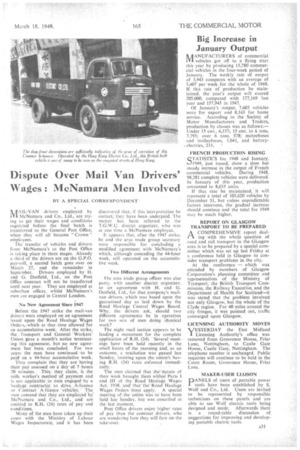Dispute Over Mail Van Drivers' Wages : McNamara Men Involved
Page 7

If you've noticed an error in this article please click here to report it so we can fix it.
BY A SPECIAL CORRESPONDENT
A A1L-VAN drivers employed by IV! McNamara and Co., Ltd., are trying to get their wages and conditions regulated before the final batch is transferred to the General Post Office, when they will all become " Crown "
employees.
The transfer of vehicles and drivers from McNamara's to the Post Office is taking place in three stages. Already a third of the drivers are on the G.P.O. pay-roll, a second batch goes over on March 27, and the remainder in September. Drivers employed by H. and G. Duffield, Ltd., on the Post Office contract will not be transferred until next year. They are employed at suburban offices, whilst McNamara's men are engaged in Central London.
No New Agreement Since 1947
Before the 1947 strike the mail-van drivers were employed on an' agreement based uponthe Road Haulage Wages Orders,: which at that time allowed for an accumulative week.. After -the strike; the -Transport and General 'Workers' Union gave a inonth's.notice terminating this agreement, but no new agreement has' been concluded. For two years the men have continued to be paid on a -44-hour accumulative week.
They complain that they are having their pay assessed on a"day of7hours 20 minutes. This; they claim, is the milk workeg's method -of payment and is -notapplicable To. Men 'engaged' by a haulage, contractor to drive A-licence or Contract klieence :vehicles-. The men contend that they are employed by McNamara and Co., Ltd., and are entitled to R.H. (24) rates of pay and conditions.
Many of the men have taken up their cases with the MiniStry of Labour Wages Inspectorate, and it has been discovered that, if thiS interpretation be correct, they have been underpaid. The matter has been referred to the T.G.W.U. district organizer, who was at one time a McNamara employee.
It appears that, after the 1947 Strike, he and the area trade group secretary were responsible for concluding a modified agreement with McNamara's which, although conceding the 44-hour week, still operated on the accumulative week.
Two Different Arrangements The area trade group officer was also party, with another district organizer, to an agreement with H. and G. Duffield, Ltd., for that company's mailvan drivers, which was based uptin the guaranteed day as laid down by the Road Haulage Central Wages Board. Why, the drivers ask, should two different agreements be in operation for two sets of men doing identical work?
The night mail section appears to be leading a movement for the complete application of R.H. (24). -Several:meetings have been held recently in the small hours of the morning and as an outcome, a reSblution was passed last Strnday, insisting upon the union's having R.1-1. (24) rates enforced inithedi
ately. • .
• The men claimed that the'rtature of their wOrk brought thein-Within' Parts and iii of the • Road -Wilda& • Wages Act, 1938, and "that'theROad,-Haulage WageS Orders-ill-kW: apply.' A special Meeting of" the tfficon Was to have been held last Sunday, kit was cancelled at the last moment.
Post Office drivers enioy higher rates of pay than the contract drivers, who Alt wondering lioW they Will fare on the take-over.


























